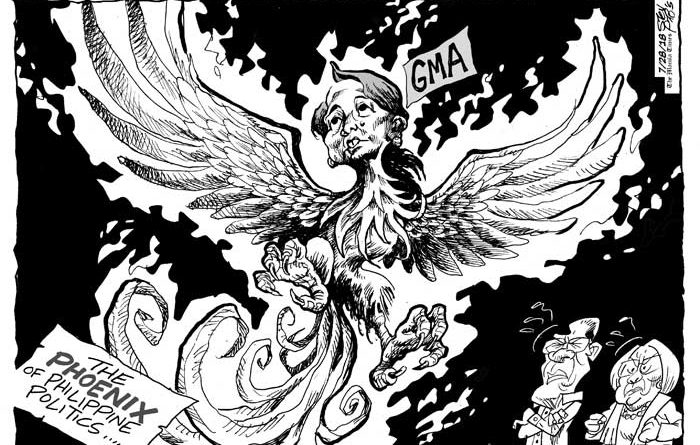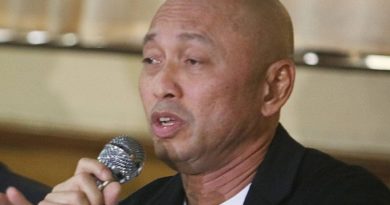OP ED: OPINION ON PAGE ONE – GMA should help DU30 overcome ‘federalism’
FORMER President and Pampanga Rep. Gloria Macapagal Arroyo’s dramatic capture of the speakership has given President Rodrigo Duterte, should he ever want to take it, a way out of his widely opposed federalism project in favor of a less controversial shift to parliamentary government, without violating the rule on constitutional amendments by getting directly involved in the proposed change. This is a service Arroyo could perform for DU30, if she wants to save him from the certain fiasco that threatens his federalism project.
What Congress can do
The House of Representatives and the Senate could work together on a constituent assembly or constitutional convention to launch the parliamentary initiative. This would be much easier to sell than the federalism project. Arroyo has excellent ties with the Senate, having served as senator from 1992 to 1998, before she was elected Vice President, and eventually succeeded to the presidency in 2001, after Joseph Ejercito Estrada was ousted.
Arroyo’s emergence as a power center has relieved DU30 of so much pressure from various forces trying to bring him to the brink. At the same time, it has given some of those who are thinking of succeeding DU30 after 2022 a new target to aim at. Unable to take on DU30 frontally, they have shifted to Arroyo as a more convenient adversary to snipe at.

They have already accused her of wanting to become prime minister in DU30’s highly endangered federalism project. But the project seems to be going completely sideways. And Arroyo should be the first one to see this. She stands a better chance with a shift to parliamentary government.
The real option
Whether or not Arroyo is thinking of it now, at the end of the day she will have to agree that it is not a failed unitary system that needs to be replaced by a misnamed “federal republic” of 18 separate, mostly insolvent parts, but a failed presidential system that needs to be replaced by a more responsive parliamentary government.
This has been my position since I was in the Cabinet (1969-1980), the Batasan (1978-1984), and the Senate (1992-2001). It saddened me that the 1973 Constitution mandated a parliamentary government, but put the real power in the hands of the President/Prime Minister rather than in Parliament. We could do nothing about it then, we have the opportunity to do what’s right now. It would be a shame if we let go of the opportunity just because we suspect the Speaker might want to use the same opportunity to expand her own power base.
I do not speak for Mrs. Arroyo at all. She and I served in the Senate at the same time from 1992 to 1998; and we worked closely together on some vital legislations, including the historic resolution concurring in the ratification of the World Trade Organization Agreement, which together with the late former Sen. Blas F. Ople we jointly defended on the floor. But we have never been in the same camp. In 1998, we ran against each other for vice president (and she won); in 2001, I did not support her presidential takeover.
The overriding reasons
Nonetheless I believe a shift to the parliamentary system is the real constitutional reform we need at this time. This is what the nation needs now, for reasons that have become so painfully clear in recent years. That the national interest could coincide or clash with the political interest of any political party or individual is no reason for us to hesitate in doing what we must do.
That Speaker Arroyo might ultimately want to pursue the same thing from her vantage position does not intimidate me at all. It should not intimidate any other citizen either. The search for what is best for the country should bar no one from participating, or competing. The only thing that should be entirely forbidden is rigging the rules of the game to make sure a particular party or individual ends up controlling the system. This is what the proponents of the bogus federal system are trying to do; it should not happen in a shift to the parliamentary system.
Even if DU30 insists on ramming his federal project through every constitutional and intellectual barrier, it can only fail. As an economist and former president, who ran the nation’s business for at least nine years, Arroyo knows or ought to know that the federal project is not economically viable. She ought to be able to tell DU30 what former Chief Justice Reynato Puno and former Senate President Aquilino Pimentel Jr. do not have the courage to tell him—that it is simply not viable. And DU30 has to accept reality and settle for what is workable. The only workable option is a shift to parliamentary government.
Enlisting Bagehot
In The English Constitution, Walter Bagehot argues the superiority of the parliamentary system to the presidential. All things considered, the parliamentary system produces better leaders than the presidential, he says. The choosing process makes all the difference. In the presidential system, the voters choose someone they do not know or think they know on the basis of the political propaganda; in the parliamentary system, parliament chooses someone from among its members, on the basis of his or her program of government and demonstrated competence.
In the one, the voter looks for someone of celebrity status; in the other, the elected members choose one among their peers for his or her proven qualities and his or her ideas about government. The president is the product of one election; the prime minister is the product of two elections. The tendency is for the quality of the latter to be better.
Parliamentary government “educates the nation,” says the author; “the presidential does not educate it and may even corrupt it.” Of course, once in a great while the presidential system could produce a Lincoln. But that’s like winning in a lottery and winning in a lottery is no argument in favor of a lottery, says the great Englishman. So, the parliamentary is preferred to the presidential.
The legislative assembly is the main organ by which the nation is educated; all government policies and acts are examined there, and everything which is worth saying and ought to be said is said there. There sits the cabinet which Bagehot calls “a combining committee—a hyphen which joins, a buckle which fastens, the legislative part of the State to the executive part of the State.” Thus, the parliamentary system is also called cabinet government.
The functions of parliament
Parliament has several functions: the elective function—to elect the prime minister and to turn him/her out when it becomes necessary; the expressive function—to express the mind of the people on all matters which come before it; the teaching function—to teach the nation what it does not know; the informing function—to inform the sovereign of what is wrong, and the grievances and complaints of particular interests; and the legislative function—to make laws.
As the legislative and executive powers are combined in parliament, there is no risk of an executive overreach into the work of the legislature; the system is totally compatible with DU30’s temperament and style. DU30 could provide the strongest argument for a shift away from the presidential system. He no longer has to worry about the separation of powers.
The only problem though is that if the prime minister figures in some silly scandal or fails to deliver on his or her program of government, he or she could be quickly replaced after parliament approves a motion of loss of confidence. In the presidential system, by contrast, a corrupt, murderous, morally degenerate or professionally unfit president could remain in office until he or she finishes his or her term, or dies, resigns, gets impeached, is permanently incapacitated, or ousted by mutinous soldiers or vast multitudes of angry citizens.
Downsizing the elections
One other important reason why we should consider a shift to the parliamentary system is that it would downsize our elections and make them more manageable and credible. It has been sufficiently demonstrated that we cannot yet conduct a clean and honest national election. Our politicians are more interested in winning at any cost than in winning in a clean and honest election. Neither does our electoral bureaucracy possess the will or the competence to conduct clean and honest elections.
The fact that the entire archipelago votes for the same set of national candidates on the same day makes it easier for cheaters to cheat and for national candidates who have lost the count in Luzon and the Visayas to buy votes in Mindanao and overtake the real winners in the final national count. This has been the pattern for the longest time.
In 2009, some senators almost came to blows on the issue of automated elections. Some of them were willing to use their fists to defend their thesis that automation was the silver bullet needed to end our corrupt elections. So, automation prevailed, and the Comelec brought in Smartmatic, the Venezuelan election provider, to conduct the 2010, 2013 and 2016 automated elections. But they junked all the security and accuracy features of the voting machine, and the result was the most scandalous elections that installed in office a wicked stream of de facto national government officials.
In a parliamentary system, we will no longer have to elect a single official nationwide. Everyone will first have to run for a seat in parliament before he or she becomes a candidate for prime minister. Even if the flawed electoral system remains, every potential prime minister will be running a focused campaign within a limited constituency, and will have an even chance, vis-à-vis his or her adversary, of controlling the variables. This is a quantum leap from the current situation where 55 million voters, scattered throughout the vast archipelago, vote directly for the highest official on the same day.
Some old politicians argue that by voting directly for the presidential candidate, Filipinos are able to establish a “personal bond” with their President. As we have seen earlier, this is sentimental nonsense. Even in an honest election, which we are still waiting for, the voters vote for a candidate they do not know and who does not know them; in a fraudulent election, their votes may not even be counted, but sold to the highest bidder. It is time for all of us to grow up and renounce a flawed system which, until the election of President Donald Trump in 2016, seemed to work well only in the United States and in some Rotary Clubs elsewhere.
 All photographs, news, editorials, opinions, information, data, others have been taken from the Internet ..aseanews.net | [email protected] |.For comments, Email to :D’Equalizer | [email protected] | Contributo
All photographs, news, editorials, opinions, information, data, others have been taken from the Internet ..aseanews.net | [email protected] |.For comments, Email to :D’Equalizer | [email protected] | Contributo









